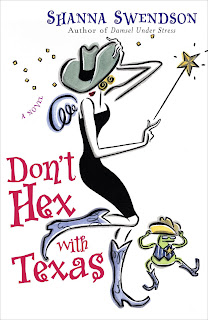STATUS: It’s suppose to snow later today so I’m working a bit from home, then walking Chutney early while on my way to the office.
What’s playing on the iPod right now? HEY THERE DELILAH by Plain White T’s
Considering I just finished attending the Northern Colorado Writers Conference (and a big shout out to Kerrie who single-handedly pulled off a terrific, well-organized conference up there), I found Jessica’s comments on Conferences over there at Bookends to be pretty spot-on.
I strongly recommend any conference organizer to hop over there and take some notes.
But Kerrie of NCW and I got into another great conversation over the weekend when I was in Fort Collins and I’d love it if conference organizers can add this to their list as well.
When agents attend conferences and participate in pitch session, our basic hope is to potentially find a new client in the mix. It doesn’t happen too often but I have found two of my clients from conferences so I’m always optimistic. After all, what are pitch sessions for if not to hook up a writer with an agent?
Now for a pitch session to work, the writer needs to have a completed full manuscript. Why? Because if an agent likes the sound of the project, she’ll ask for sample pages (probably the first 30 or 50 pages). If the agent likes what she reads, she’ll want to request the full novel (and that can happen just a couple of weeks after sample pages are requested so a writer needs to be ready).
If there is no full manuscript, therein lies the problem.
As a writer, you always want to put your absolutely best writing foot forward—so you shouldn’t need to rush or send in a novel prematurely just because an agent requested it and the full wasn’t ready.
It’s a good way of getting a rather prompt rejection and then that avenue is closed (as you only get one shot at an agent) until you either do a significant revision and resubmit (but an agent is always going to be slightly hesitant about a resubmit—see my previous blog post on Love The Second Time Around) or you have a new novel to shop. Which can take a year or more to prepare.
But most new writers don’t realize this. They see “pitch session with Agent” and sign right up because who wouldn’t want to talk with an agent, right?
But ultimately, a writer can’t pitch a project that doesn’t exist or is unfinished because there is nothing for me to see at this point in time. Out of my 12 appointments at NCW, I only requested sample pages from 4 participants as all the others either had just started a project, were in the middle, or had only an idea for a novel.
I hate to say it but that made these pitch sessions a waste of my time because I ONLY want to talk to authors who have project ready to be read. Sorry if that sounds heartless but it is the truth. Writers with “ideas” for a great novel are a dime a dozen. It’s that one in a hundred writer who actually has the perseverance and stamina to sit down and write the entire thing (which is a huge achievement all in itself since the majority of aspiring writers never even make it that far).
Not to mention, how many great writers did I miss who did have a completed novel because my pitch slots were full? Ack.
So here’s what I’d like to add to Jessica’s list. I know it makes more work for the conference organizers but it would make a HUGE difference in the power of the pitch sessions.
Please don’t allow just anyone to sign up for a pitch with an agent. All interested writers should submit a mini application to pitch that includes the following:
1. Title of project
2. Genre
3. Word count
4. Is the manuscript complete? Yes or No.
5. previous publications if any
6. Why is this agent the right fit for your project?
If the writer checkmarked NO for number 4, then the pitch session is denied. If the manuscript is finished, then the conference organizer can check the project next to the agent’s bio (which should include a list of what they are currently looking for) and make sure it is a match. Then sign the writer up for the pitch.
Most conferences right now assume that writers will do their homework (because heck, that would only be to their advantage) and sign up with the appropriate agent.
I find that this is rarely true. In fact, I’ve even had authors pitch me projects my agency clearly doesn’t represent and when I ask why, they will often say that the other agent slots were full and they just wanted to practice the agent pitch.
Argh! I’m always polite but I don’t want to be somebody’s practice session! I only want to hear about projects that might get me a new client whose project I can sell!
Calling all conference organizers! I beseech you to take this extra step. All agents will thank you.

